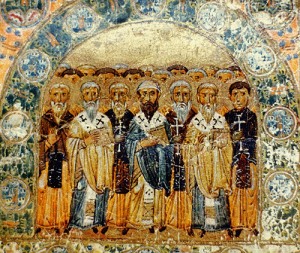 Three men came to Abraham, and stood over him.
Three men came to Abraham, and stood over him.
Observe how it is that they come upon him, but not against him. He had subjected himself to God’s will, and for this reason God is said to stand over him.
They stood over him; not against him to repulse him, but over him for protection. He received the three men and served them loaves out of three measures.
Why is this, brethren, unless it means the mystery of the Trinity?
He also served a bullock; not a tough one, but a good, tender one.
Now what is so good and tender as he who humbled himself even unto death? He himself is that fatted calf which the father killed upon receiving his repentant son.
For God so loved the world that he gave his only–begotten Son. For this reason Abraham went to meet the three men and adored them as one.
In the fact that he saw three, as was already said, he understood the mystery of the Trinity; but since he adored them as one, he recognized that there is one God in the three persons.
Now where did this happen? Near the oak of Mamre, which in Latin is interpreted as ‘vision’ or ‘discernment’.
The vision and discernment of Abraham delighted the Lord; Abraham was clean of heart, so he could see God. Therefore, in such a place and in such a heart the Lord can have his feast.
Of this vision our Lord spoke to the Jews in the Gospel when he said: Abraham rejoiced that he was to see my day, he saw it and was glad.
He saw my day, he says, because he recognised the mystery of the Trinity. He saw the Father as day, the Son as day, the Holy Spirit as day, and in these three, one day.
Thus, the Father is God, the Son is God, the Holy Spirit is God, and these three are one God. For individually each person is complete God.
Moreover, because of the unity of substance, in those three measures of flour the Father, Son and Holy Spirit is not unfittingly understood.
However, this can also be taken in another way by understanding Sarah as the Church; the three measures of flour then are faith, hope, and charity.
In these three virtues all the fruits of the Church are contained, so that if a man merits to possess the three within himself, he can with security receive the entire Trinity at the banquet of his heart.
Caesarius of Arles (469/70-542): Sermon 83.2,4-5, trans. M. M. Mueller, Fathers of the Church series, vol. 47, from the Monastic Office of Vigils for Sunday of the 3rd Week in Ordinary Time, Year 2.








